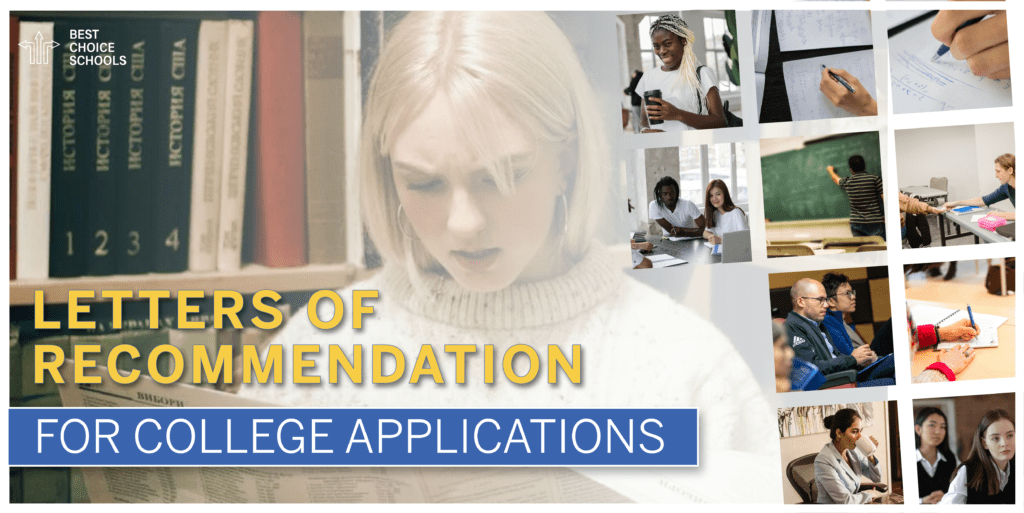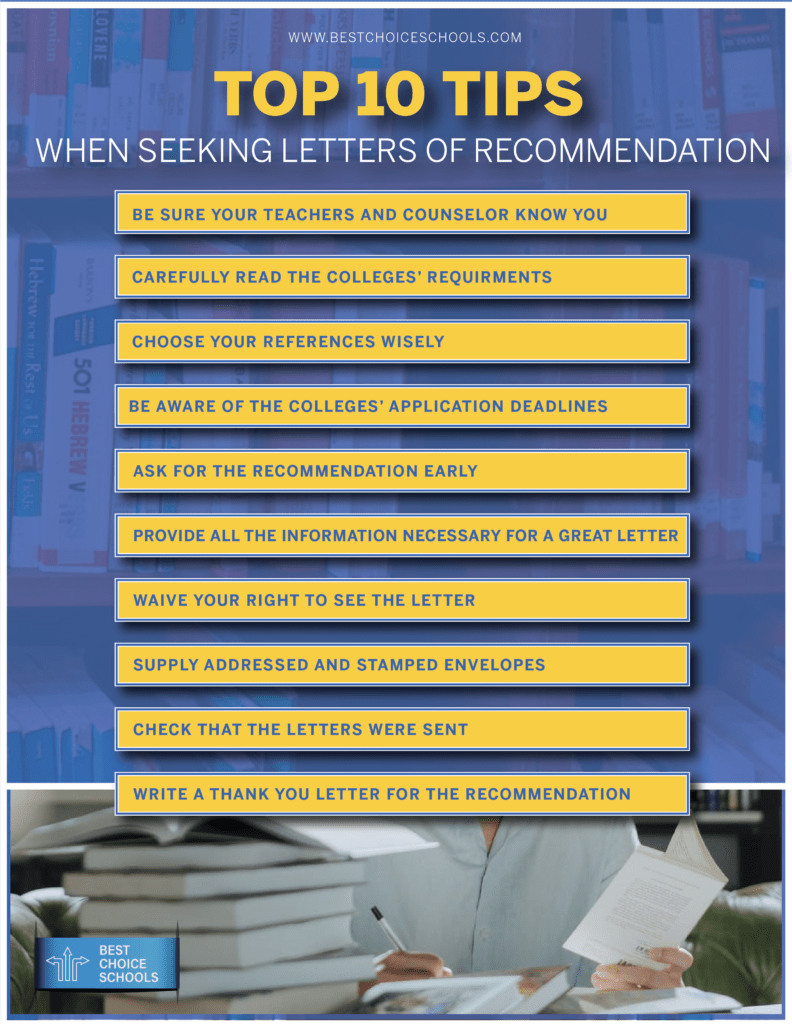
It’s part of a high school rite of passage. It can be a vulnerable moment. But, it’s a time to be proud and show off your connections. So, what do these three statements have in common? They all describe that time in your life when you need to ask for a letter of recommendation.

When applying to college, you will need to request a letter of recommendation from a few people who know you well. Many high school students struggle to determine which individuals are the best candidates for this task. Here are some tips that may help you get good letters of recommendation and help you get into an affordable college with good graduation rates.
Most of us have had to ask for a letter of recommendation at some point. But, as straightforward as it might be to approach someone—someone you know, no less—and ask them to write up a letter, we all know how complicated that transaction can be.
Who can I ask? Who should I ask? And how should I do it? Between those three critical questions lies an answer unique to every student but very much the same in its most basic sense. You want to be professional, prepared, and familiar with the letter writer. Just the same, it’s important not to stress too much. Find a balance that fits you, and lead with that.
So, what is the truth behind asking for letters of recommendation (“letters” for short)? In the following article, we’ll break down everything you need to know to ask for recommendations with the most optimal, tried-and-true strategies. Let’s get started—there’s no time to waste!
See Also: What Impact Do Recommendation Letters Have on the College Admissions Process?
Table of Contents
Preparing To Ask For A Letter Of Recommendation
One of the most common reasons students visit their high school counselor, or guidance office is to get advice on asking for letters of recommendation. Some students share feelings of apprehension, nervousness, and stress. Others struggle less. No matter how you’re feeling about this process, it’s natural.
The best way to begin is, like many life events, to prepare. It’s never too early to start planning for this period near the end of your high school career. We recommend you begin making a draft list of instructors you’d like to ask as soon as your sophomore year.
Why? Well, for one, you’re much more likely to obtain letters of recommendation that are more detailed, personal to you, and attractive to college admissions officers if you ask a trusted teacher who’s known you for years. Admissions teams value letters of recommendation that tell a narrative: a narrative about you, your personal growth, and your academic development.
James G. Nondorf of the University of Chicago says that you might think about asking teachers from classes where you have a high grade, but this isn’t the only option.

“It’s nice to hear that you got an A in their class; it’s even better when an instructor can talk about how you think, solve problems, and engage with new material.”
In other words, prepare a list of letter writers that know you personally and can write a letter that’s rich with first-hand observations of how you’ve grown as a student.
We’re stressing the importance of preparing a lot, that’s true. But it’s also true that admissions staff value “hard factors” like GPA and test scores just as much as the “soft factors” such as your essays, extracurriculars, and yes, your letters of recommendation.
A list of methods to prepare for asking for college recommendations might include:
- Add at least a one-month buffer period to your calendar between your college’s deadline for letters and the date you plan to ask your teacher.
- Make a list with more potential letter writers than you need in case one of your expected recommendations isn’t available.
- Be sure you know precisely how many recommendations you need before asking.
Related: The 20 Most Affordable Colleges with High Four-year Graduation Rates 2021
Whom Can You Ask?
The short answer is anyone. But you wouldn’t be helping your record or your admissions profile very much if the admissions committee discovered that your letters all came from your grandparents and parents.
“Why?” you might ask. “My relatives know me better than anyone. They can attest to my personal and emotional growth, and there’s no doubt they’ll write a glowing review of me and my time at school.” While that may be true, whom you ask for a recommendation requires a little more forethought.
Below, we’ll cover exactly who you shouldn’t ask for a recommendation, so scroll down for more information. But first, we want to develop a list of the best authorities to write your recommendation. Thankfully, you won’t have to search very far.
| WHO TO ASK FOR A COLLEGE LETTER OF RECOMMENDATION |
| School Counselor s |
| Academic Teachers |
| Athletic Coaches |
| Employers |
| Clergy Members or Pastors |
| Youth Group Leaders |
| Extracurricular Instructors |
| Mentors |
The first thing to keep in mind is the perspective of your college admissions committee. It’s they who will be judging you based on the letters. So, be sure you pick letter writers who will write reviews that would please the committee, not you.
Say your athletics instructor has known you for years, followed you as you grew into a mature person, and knows how well you’ll perform in college. On the other hand, you have your math teacher who gave you an A but never connected one-on-one with you. It may be impressive that you got an A in math, but the better letter may likely come from your athletics teacher.
What we’re saying is: organize your list of recommenders so that they’ll appeal to the admissions committee first and you second.
But who else can you ask?
Firstly, instructors who know you personally are always excellent choices. Admissions committees prefer college recommendations that come from instructors you’ve worked with for as many as two or three years in the past—the more recent, the better. Second, give your college a well-rounded but current picture of your academic and personal development.
Next, ask for recommendations from teachers who know you out of class or from extracurricular events. Did you attend a language conference, a science expo, or a class play with a trusted instructor? Often these sources can add an outsider’s perspective to your group of recommendations. Admissions committees appreciate students who stand out outside of class just as much as in class.
Other adults can help broaden your recommendations list. For example, you can ask your longtime employer, coach, church member, or a local leader who has helped form your values. In addition, ask anyone who can share a unique side of you or give a personal anecdote that will add to your character.
Lastly, double- and triple-check your college admissions requirements. Most universities require one or three recommendations, one usually coming from a guidance counselor. But not all colleges operate the same way. For instance, many ask that you obtain a recommendation from an instructor and at least one from another source.
Keep your potential school’s requirements close to you because you often won’t get a second chance to change a recommendation if you failed to read the details.
Are There People Not To Ask?
As we mentioned above, there are certain people not to ask for a recommendation—even if they’re trusted and close mentors.
The first question many seniors ask is, “Can I ask my parents or relatives?” Once again, you’re free to put together your group of recommenders however you wish. But we have to say that you should not ask your family.
A recommendation from a family member will no doubt be glowing, lengthy, and insightful. But the source isn’t reputable for admissions officers. The family bias will almost always be too intense for your college to trust impartially. Almost everyone has a family member who will share all your best qualities (and curious lack of weaknesses).
Another recommendation that’s best left off your record is from instructors from four or more years ago. Their opinion of you may be obscure, vague, or unfactual. Though time heals all wounds, your long-lost six-grade shop teacher might have to fill her letter with generalities that don’t look good for colleges.
Steer away from famous or well-known people writing your recommendation unless they know you well. It may look impressive to you to have a Fortune 500 CEO write a short letter for you, but admissions will be able to tell if this person mentored you or not.
Try not to ask for a recommendation from someone who won’t write with enthusiasm. College applicant staff have to weed through thousands of student records every day during the college application season. So why not make yours stand out with colorful and well-written recommendations? No one wants to read the same page of bland compliments for days.
Besides the few people above, you have the world to choose from. The best policy is to follow your excitement. Ask yourself, which people can I pick to write the best, most vibrant, and glowing recommendations for me? A diverse cast of recommenders will also look great on college applications, but exciting letters will always make admissions people smile.
| WHO NOT TO ASK |
| Your parents or grandparents |
| Your coworkers |
| Your friends or fellow students |
| Your elementary school teachers |
How Do You Ask?
Now we come to the nitty-gritty part of asking for recommendations. In a word, be kind, courteous, and brief. Next, let’s dive deeper into how you should ask for a letter.
Keep this in mind: some instructors have received dozens or even hundreds of recommendation requests for the school year. As a result, popular mentors like core room teachers, coaches, or principals can get overwhelmed.
Also, remember how long it will take for these mentors and leaders to write a letter. Some recommendations take hours to complete under certain circumstances. So it’s always a good idea to think about your recommender’s time and energy before approaching them.
When asking for a recommendation, one goal is to limit the level of difficulty the mentor could encounter writing your letter. How can you make it easier? Preparation is key.
The first thing to do is approach your mentor when they’re free and open for a brief meeting. The most sincere way to ask for a letter is to approach your mentor face to face, but sometimes it’s useful to send an introductory email first. Then, simply ask if you can speak with them at a particular time—no need to bring up the letter.
When you meet with your recommender, be brief but direct. Tell them straight away that you’d appreciate their recommendation—no need to beat around the bush.
Give your mentor a little background information to get them acquainted with your history together. For example, remind them of projects and specific assignments you shared, challenges you’ve experienced, or any other small details that will trigger their memory.
If you choose, you may offer a printed resume or list of achievements for your mentor.
Finally, tell them the exact date by which you need the recommendation returned. Be specific. It helps professionals and people who write many letters to have a clear idea of which applications are due and when.
What Should I Avoid When Asking?
Meeting a mentor to ask for a letter of recommendation shouldn’t take any longer than five minutes. That is unless you and your recommender have a close personal relationship.
Preparing and asking for a letter isn’t all that difficult. If you struggle with communicating with your mentor, don’t worry. The majority of high-schoolers do. Keep in mind: mentors know how much some students struggle. As soon as you explain your task, everything will usually fall into place.
But there are some things to avoid when asking for a recommendation. For one, don’t approach your recommender, then ask them immediately to write a letter. It’s off-putting, a bit cold and clinical, and might not give the writer a good first impression.
You can lead by reminding them of your recent work with them, your relationship, or specific notes about why you’re choosing them to write for you.
Again, don’t shuffle around your request when the time’s right to ask for the letter. A one-sentence question will do: “I was hoping you would write me a letter of recommendation.”
Be confident, but don’t be headstrong. Mentors can tell if you’re approaching them for a letter with a “Yes” already in mind. Remember, not everyone has the time or energy to write a serious recommendation. Don’t make a request that can’t be denied. Ask honestly and openly, and thank them if they can’t write the recommendation for you.
Conclusion
It might seem like there’s a whole lot of preparation required just for a brief meeting. That’s true, but the more you know your mentor, your request, and your college’s requirements, the smoother the process will be.
Be confident in your college application requirements, provide your recommender with clear instructions and dates, and plan at least one year in advance—that’s the foolproof way to ask for a recommendation letter.
One last thing: don’t forget to send your mentors a thank you letter for all their time. Remember, it takes your writer far longer to draft up the letter than it takes you to request it!
Related Articles:




